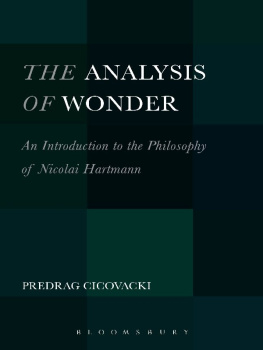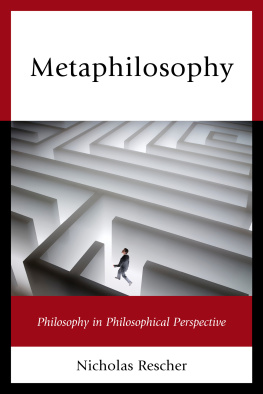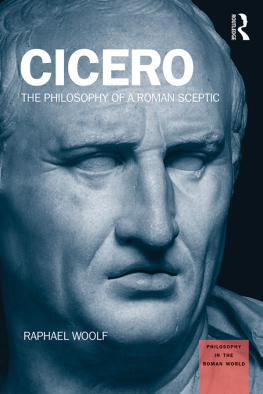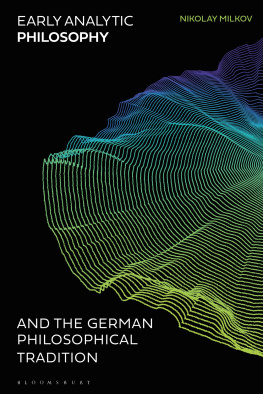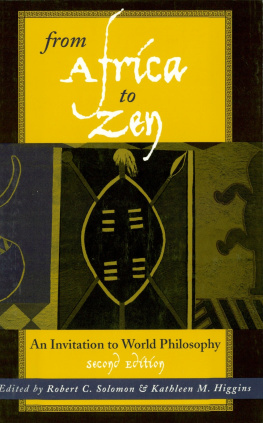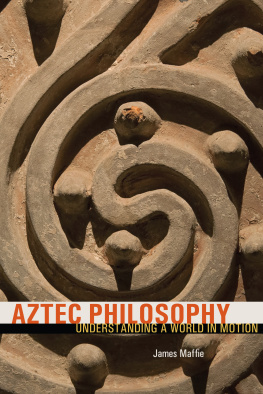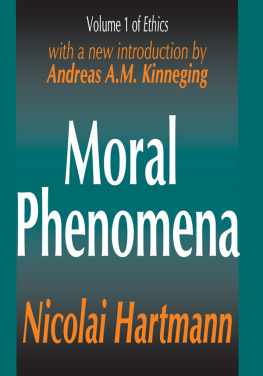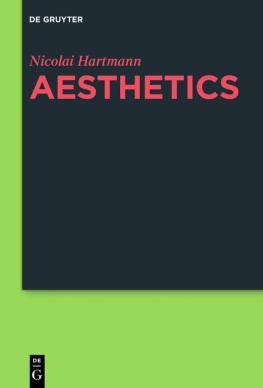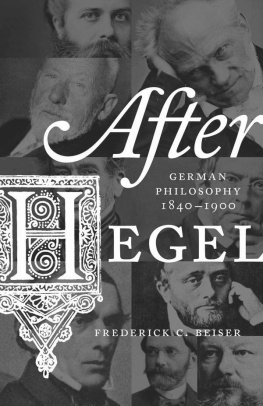The Analysis of Wonder
The Analysis of Wonder
An Introduction to the Philosophy of Nicolai Hartmann
Predrag Cicovacki

For Heidi:
Keep Shining
A man does not learn to understand anything unless he loves it.
Goethe
Contents
| 1882 | Nicolai Hartmann was born on February 20, in Riga, son of Carl August Hartmann and his wife Helene, who were Baltic Germans. Nicolai was one of their four children. |
| 1897 | Attends a German-speaking gymnasium in Saint Petersburg. |
| 190203 | Studies Medicine in Dorpat. |
| 190305 | Studies philosophy and classical languages in Saint Petersburg. |
| 190507 | Continuation of studies in Marburg. |
| 1907 | Defends PhD thesis: ber das Seinsproblem in der griechischen Philosophie vor Plato [On the Problem of Being in Greek Philosophy before Plato]. |
| 190708 | Returns to Saint Petersburg to teach Greek and Latin in a gymnasium. |
| 1909 | Defends the Habilitation: Des Proklus Diadochus philosophische Anfangsgrnde der Mathematik [The Philosophical Foundations of Mathematics of Proclus Diadochus].
Publication of Platos Logik des Seins [Platos Logic of Being]. |
| 1911 | Marries Alice Stephanitz. |
| 1912 | Publication of Die philosophischen Grundfragen der Biologie [The Fundamental Philosophical Questions of Biology]. Birth of daughter Dagmar. |
| 191418 | Service in German Military in World War I. |
| 191925 | University Professor of Philosophy in Marburg. |
| 1921 | Publication of Grundzge einer Metaphysik der Erkenntnis [Basic Elements of a Metaphysics of Knowledge]. |
| 1923 | Publication of Die Philosophie des deutschen Idealismus, Bd. I: Fichte, Schelling und die Romantik [The Philosophy of German Idealism, Vol. 1: Fichte, Schelling and the Romantics]. |
| 192530 | Professor in Cologne. |
| 1926 | Presents ber die Stellung der sthetischen Werte im Reich der Werte berhaupt [On the Place of Aesthetic Values in the Realm of Values] at the Sixth International Congress of Philosophy, at Harvard University, Cambridge, Massachusetts. Publication of Ethik [Ethics]. Divorce from his first wife. |
| 1929 | Marries Frida Rosenfeld. Publication of Die Philosophie der deutschen Idealismus, Bd. II: Hegel [The Philosophy of German Idealism, Vol. 2: Hegel]. |
| 1930 | Presents Kategorien der Geschichte [Categories of History] at the Seventh International Congress of Philosophy, in Oxford. Birth of son Olaf. |
| 193145 | Professor in Berlin. |
| 1932 | Birth of daughter Lise. |
| 1933 | Publication of Das Problem des geistigen Seins: Untersuchungen zur Grundlegung der Geschichtsphilosophie und der Geisteswissenschaften [The Problem of Spiritual Being: Investigations on the Foundations of the Philosophy of History and the Human Sciences]. |
| 1935 | Publication of Zur Grundlegung der Ontologie [On the Foundations of Ontology]. |
| 1938 | Publication of Mglichkeit und Wircklichkeit [Possibility and Actuality]. |
| 1940 | Publication of Der Aufbau der realen Welt: Grundriss der allgemeinen Kategorienlehre [The Structure of the Real World: Outline of a Theory of the General Categories]. |
| 1943 | Publication of Neue Wege der Ontologie [New Ways of Ontology]. |
| 194550 | Professor in Gttingen. |
| 1950 | Publication of Philosophie der Natur: Abriss der speziellen Kategorienlehre [Philosophy of Nature: Sketch of a Theory of the Special Categories]. Dies on October 9. |
| 1951 | Posthumous publication of Teleologisches Denken [Teleological Thinking]. |
| 1953 | Posthumous publication of sthetik [Aesthetics]. |
| 195558 | Posthumous publication of Kleinere Schriften [Shorter Works], Bd. I: Abhandlungen zur Systematischen Philosophie (1955) [Vol. I: Essays Concerning Systematic Philosophy]; Bd. II: Abhandlungen zur Philosophie-Geschichte (1957) [Vol. II: Essays on the History of Philosophy]; Bd. III: Vom Neukantianismus zur Ontologie (1958) [Vol. III: From Neo-Kantianism to Ontology]. |
The chronological table is mostly based on Martin Morgenstern, Nicolai Hartmann zur Einfhrung (Hamburg: Junius Verlag, 1997), 1428 and 1912. Also used are Robert Heiss, Nicolai Hartmann: A Personal Sketch, Personalist 42:1961, 46986; Nicolai Hartmann und Heinz Heimsoeth im Briefwechsel, ed. Frida Hartmann and Renate Heimsoeth (Bonn: Bouvier Verlag Herbert Grundmann, 1978); Hans-Georg Gadamer, Philosophical Apprenticeships, trans. R. R. Sullivan (Cambridge, MA: MIT Press, 1985); and Wolfgang Harich: Nicolai HartmannLeben, Werk, Wirkung, ed. Martin Morgenstern (Wrzburg: Knigshausen & Neumann, 2000).
A few years ago, a book was published with the title, Why Arendt Matters. In the case of Hannah Arendt, such consideration is hardly needed. Her analysis of the human condition, the origin of totalitarianism, and the banality of evil belong to the highlights of the twentieth-century philosophy, especially in its second half. While she may not get all the recognition she deserves, especially among philosophers, Arendts ideas are widely discussed and her books are available even in small bookstores.
This is not the case with Nicolai Hartmann (18821950). In the period between 1925 and 1950, he was considered one of the leading German philosophers. His worksnumerous, systematic, displaying his encyclopedic knowledge and covering a vast variety of subjects, from ontology and epistemology to ethics and aesthetics quickly went into second, third, and in some cases even fourth editions. His 800-plus-page Ethik was translated into English five years after its publication, but that ended up being the only one of his major books rendered into this language. In the second half of the twentieth- and at the beginning of the twenty-first century, Hartmann has been a neglected philosopher. He has been a forgotten giant.
I find this state of affairs puzzling. From the first years of my philosophy studies on, Hartmann has been one of my inspirations, one of my teachers. Every time I open his books, I learn something; his texts compel me to think afresh about a variety of philosophical issues. For this reason, with this introduction to his philosophy, I want to re-open the case for Hartmann. This book will focus on the questions concerning the nature and value of Hartmanns philosophy. More formally, the questions are:
What is at the core of Hartmanns philosophy?
What relevance, if any, does Hartmanns philosophy have for us in the twenty-first century?
There are two main obstacles for this project. The first is that philosophy itself is in such a state of disarray that it is not easy to say anymore either what philosophy is, or what role it is supposed to play in our age. The second obstacle is that Hartmann kept away from all the main currents of philosophy of his time; this makes it difficult to engage him in a dialogue that could help estimate the nature and value of his philosophy. I will briefly clarify both issues.
Next page
